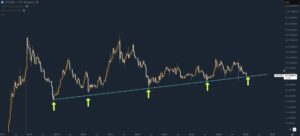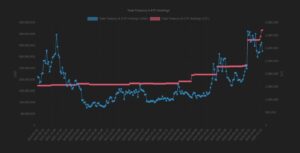The foundations of Bretton Woods II came under assault last week when the G7 seized Russia’s exchange reserves, Credit Suisse said in a recent report.
The US investment bank said that the Russia-Ukraine war will create a new financial world order from which Bitcoin is set to benefit, assuming it still exists.
The head of short-term interest rate strategy, Zoltan Pozsar, wrote in a Monday report that Western sanctions on Russia will probably cause a paradigm shift in the way the world organises money and reserves, a “Bretton Woods III” kind of scenario.
Cryptocurrencies aren’t going away. Buy Bitcoin & Litecoin here.
“From the Bretton Woods era backed by gold bullion, to Bretton Woods II backed by inside money, to Bretton Woods III backed by outside money,” the strategist wrote.
The banker argues that the disintegration of Bretton Woods II took place last week once G7 countries chose to seize Russia’s foreign exchange (FX) reserves, leading to an increase of outside money – reserves kept as commodities – over inside money – reserves stored as liabilities of global financial institutions.
The report states:
We are witnessing the birth of Bretton Woods III – a new world (monetary) order centered around commodity-based currencies in the East that will likely weaken the Eurodollar system and also contribute to inflationary forces in the West.
According to the Credit Suisse analyst, Russia can no longer make use of hefty FX reserves which it accumulated through commodity exports over decades in order to defend the depreciating ruble. Additionally, the country’s ability to export commodities has been hurt due to sanctions and “buyer’s strike” in the West.
The strategist wrote:
What we are seeing at the 50-year anniversary of the 1973 OPEC supply shock is something similar but substantially worse – the 2022 Russia supply shock, which isn’t driven by the supplier but the consumer. The aggressor in the geopolitical arena is being punished by sanctions, and sanctions-driven commodity price moves threaten financial stability in the West.
Pozsar argues that while Western central banks can’t close gaps between Russian and non-Russia commodity prices due to sanctions, the People’s Bank of China can “as it banks for a sovereign who can dance to its own tune.”
Destabilising Global Financials
According to Poszar, Western sanctions have such a profound effect on global finances that it’s probable for there to be a new monetary standard once the war in Ukraine is over – of which Bitcoin will be a part of.
He wrote:
If you believe that the West can craft sanctions that maximize pain for Russia while minimizing financial stability risks and price stability risks in the West, you could also believe in unicorns.
As so-called outside money trumps inside money, the crisis will end up differently than al others ever since Nixon broke off the gold standard in 1971 – which ended the era of commodity-based money.
Poszar concluded by noting that Bitcoin will be a net-beneficiary once the war ends.
When this crisis (and war) is over, the U.S. dollar should be much weaker and, on the flipside, the renminbi much stronger, backed by a basket of commodities. After this war is over, ‘money’ will never be the same again…and Bitcoin (if it still exists then) will probably benefit from all this.
Bitcoin added $130 billion overnight as a leaked document on the upcoming executive order from the US Biden administration made the rounds.
Join the telegram channel for updates, charts, ideas and deals.
Did you like the article? Share it!


